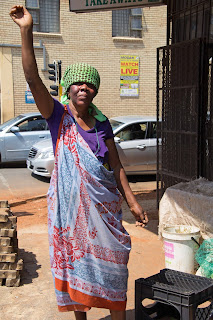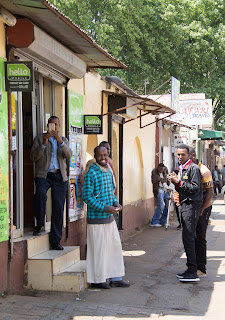The elephant looks gigantic as he silently enters our campsite. We move slowly into our baking hot car and watch the elephant extend his trunk sniffing the air next to our side window. He is so close that we can see his long eyelashes. Finally, he brushes past the car and proceeds to the river to drink and shower.
Our adventure
begins when we disembark our flight in Kasane in northern Botswana. Bushlore is
already waiting for us to hand over the two powerful 4WD camping cars we have
rented for our two families. After going through the equipment, we are off to
stock up on groceries, drinks and firewood before heading to the lodge we have
booked for the first night. The following five nights we will be camping in the
wild.
Next morning we
head into Chobe National Park and drive in the direction of Savuti Camp, 192 km
away. The first half of the route is tarred but this ends abruptly and transforms
quickly into very, very loose sand tracks. It is already mid-day and close to
40 C, which makes the sand even looser and the drive even more challenging. The
car slides and wiggles from side to side in the tracks but we don't get stuck
as we have luckily lowered the tyre pressure.
October is the
end of the dry season and the landscape is extremely rugged. The trees extend
their blackened branches towards the blue sky, waiting for the rain to bring
back life and food for the animals. Red dust clouds fill the air as we drive past.
Countless waterholes are hardened grey mud and completely dried up. It is
therefore easy to spot the impalas and kudus seeking shade, the giraffe trying
to reach the few green leaves in the treetops and the elephant herds crossing
the desert in their search of water.
 Our first
campsite is in Savuti, an area known for its abundance of lions and leopards. This
makes me nervous as we are travelling with children and the camp is unfenced.
We see people camping on the ground and although it is supposedly safe, with
even elephants tiptoeing around the tent ropes, I feel happy that we have opted
for the rooftop tents, which fold out on top of the car.
Our first
campsite is in Savuti, an area known for its abundance of lions and leopards. This
makes me nervous as we are travelling with children and the camp is unfenced.
We see people camping on the ground and although it is supposedly safe, with
even elephants tiptoeing around the tent ropes, I feel happy that we have opted
for the rooftop tents, which fold out on top of the car.
We have been
warned about hyenas, feasting on anything we might leave out, so we wash the
dishes thoroughly and pack all food away after dinner. As more and more stars
emerge in the darkening sky, we sit around the campfire with only the dancing
fire as light and the wild bush surrounding us. We can hear hyenas laughing, a
lion roaring and elephants trumpeting but none of them come too close to make
us uncomfortable.
While Savuti is
grassland with sandy tracks and some trees, our next destination Linyanti has
denser bush and lots of trees where elephants thrive. They love to eat Mopane
trees and there is plenty of water to drink in the river. We can see big herds
of female elephants with babies as well as impressively sized lone males and
groups of teenage males showing off their braveness to each other. When we
reach our campsite we realise that their path to the water goes right through
and a few elephants give us a scare before they finally decide to find another
route a few metres to the side. They move amazingly silently and are suddenly
close to us without warning. Only the occasional stomach rumbling betray them
as these giants manage to play hide and seek behind the bushes.
Most of the
campers leave the campsite early in the morning in order to go for game drives,
as the cooler mornings and evenings are the best times to see animals. Travelling
with children makes our mornings more relaxed and we enjoy bacon and eggs
prepared on the gas cooker without rush. Only the birds and mongooses disturb
us as they try their best to snatch our food.
 On our way to
Ihaha campsite, our next destination, we encounter the King of the bush. Two
male lions with impressive manes and a female lion have sought shade under a
tree and they yawn and flip their tails to chase away flies when we stop to
admire them. Even the accidental honking of the car horn does not seem to bother
them at all.
On our way to
Ihaha campsite, our next destination, we encounter the King of the bush. Two
male lions with impressive manes and a female lion have sought shade under a
tree and they yawn and flip their tails to chase away flies when we stop to
admire them. Even the accidental honking of the car horn does not seem to bother
them at all. Ihaha campsite is
lovely and completely different from the two previous ones. Huge trees offer
much needed shade and the landscape is open savannah with the Chobe river
flowing through. Namibia is just across the river and on both sides there are zebras,
impalas, waterbucks and warthogs grazing in huge herds.
Ihaha campsite is
lovely and completely different from the two previous ones. Huge trees offer
much needed shade and the landscape is open savannah with the Chobe river
flowing through. Namibia is just across the river and on both sides there are zebras,
impalas, waterbucks and warthogs grazing in huge herds.
The days are hot
but nights are chilly. We sleep with the tent open on two sides with only
mosquito nets closed, in order to have a cooling breeze. When the first rays of
light come up over the horizon, we wake up to enjoy the fabulous morning
sunrise. The golden circle rising behind the bush and the acacia trees create a
silhouette more beautiful than any painting. The magic does not last long and a
new day has begun.
 Seeing wild
animals in their natural surroundings is fantastic but above all we enjoy being
in the wilderness and feeling part of nature without mobile networks and
internet connections. The tranquil evenings when we watch the campfire with a
glass of wine in our hands and the children barbeque marshmallows while we are
listening to the sounds of the hippos grunting nearby, the elephants cracking branches
and the hyenas howling are simply unbeatable.
Seeing wild
animals in their natural surroundings is fantastic but above all we enjoy being
in the wilderness and feeling part of nature without mobile networks and
internet connections. The tranquil evenings when we watch the campfire with a
glass of wine in our hands and the children barbeque marshmallows while we are
listening to the sounds of the hippos grunting nearby, the elephants cracking branches
and the hyenas howling are simply unbeatable. 


























































